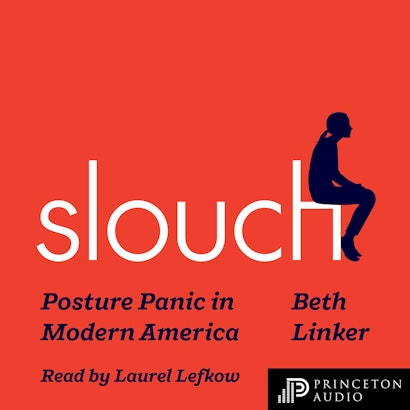In 1995, a scandal erupted when the New York Times revealed that the Smithsonian possessed a century’s worth of nude “posture” photos of college students. In this riveting history, Beth Linker tells why these photos were only a small part of the incredible story of twentieth-century America’s largely forgotten posture panic—a decades-long episode in which it was widely accepted as scientific fact that Americans were suffering from an epidemic of bad posture, with potentially catastrophic health consequences. Tracing the rise and fall of this socially manufactured epidemic, Slouch also tells how this period continues to feed today’s widespread anxieties about posture.
In the early twentieth century, the eugenics movement and fears of disability gave slouching a new scientific relevance. Bad posture came to be seen as an individual health threat, an affront to conventional race hierarchies, and a sign of American decline. What followed were massive efforts to measure, track, and prevent slouching and, later, back pain—campaigns that reached schools, workplaces, and beyond, from the creation of the American Posture League to posture pageants. The popularity of posture-enhancing products, such as girdles and lumbar supports, exploded, as did new fitness programs focused on postural muscles, such as Pilates and modern yoga. By 1970, student protests largely brought an end to school posture exams and photos, but many efforts to fight bad posture continued, despite a lack of scientific evidence.
A compelling history that mixes seriousness and humor, Slouch is a unique and provocative account of the unexpected origins of our largely unquestioned ideas about bad posture.
Awards and Recognition
- A Choice Outstanding Academic Title of the Year
- An Economist Best Book of the Year
Beth Linker is a historian of medicine and disability and a former physical therapist. She is the Samuel H. Preston Endowed Term Associate Professor in the Social Sciences in the Department of History and Sociology of Science at the University of Pennsylvania. She is the author of War’s Waste: Rehabilitation in World War I America, and her work has been featured in The New Yorker, the Boston Globe, and other publications. Laurel Lefkow is an award-winning narrator, actor, and voice artist. A frequent voice on BBC Radio 4, she appears in The Diplomat and Black Mirror on Netflix and has narrated more than four hundred audiobooks.
“Slouch is a gripping read that made me sit up a little straighter in my chair—and taught me how that very impulse, while no longer imposed by campus medical inspectors or stiff ‘posture fashion,’ has come to be so ingrained in the American psyche. Our attitudes about health, beauty, ability, race, and more are vividly, and often surprisingly, revealed through how we have surveilled the shape of our spines. Beth Linker’s rigorous and accessible history illuminates our culture, politics, and society.”—Natalia Mehlman Petrzela, author of Fit Nation: The Gains and Pains of America’s Exercise Obsession
“From a preeminent historian of disability, Slouch lights up the corners where ableism still lurks. Inventive, persuasive, and important, Beth Linker’s wide-ranging book follows the curves of American posture science through the intersections of race, class, gender, sexuality, and citizenship. This book is ardently needed—to support more liberatory notions of beauty, belonging, power, consent, and what it means to be human.”—Laura Stark, author of Behind Closed Doors: IRBs and the Making of Ethical Research
“Who would have thought that slouching could be so riveting? Acclaimed historian Beth Linker has written an enthralling account of posture, prejudice, panic, and disability. Essential reading for anyone curious about bodies.”—Joanna Bourke, author of The Story of Pain: From Prayer to Painkillers
“Slouch persuasively shows that the Ivy League nude posture photo scandal was just a small part of the story of a twentieth-century public health program—one based on the false idea that there is a single optimal posture for everyone. Beth Linker does a wonderful job of straightening out the story of bent backs!”—Jonathan Marks, author of Is Science Racist?
“Slouch unearths the history of posture to reveal how it was more than a signifier of good breeding and class civility: it was a central aspect of social and personal hygiene that, if neglected, could become a public health crisis. A richly detailed book about what it meant—and means—to be ‘posture conscious.’”—Jaipreet Virdi, author of Hearing Happiness: Deafness Cures in History

